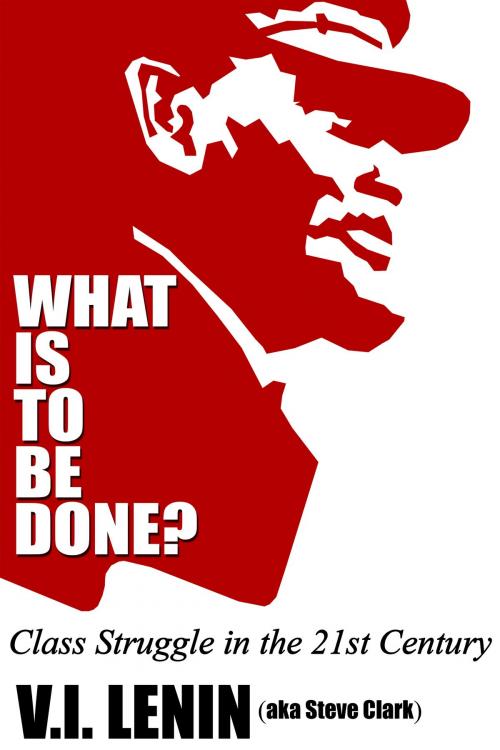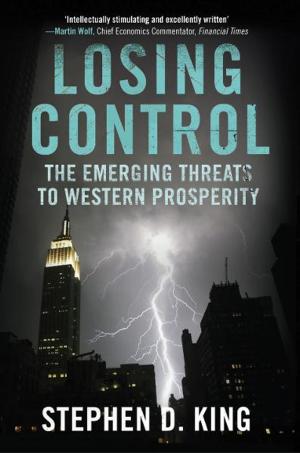What Is To Be Done? Class Struggle in the 21st Century
Nonfiction, Social & Cultural Studies, Political Science| Author: | Steve Clark | ISBN: | 9781310334344 |
| Publisher: | Steve Clark | Publication: | May 19, 2015 |
| Imprint: | Smashwords Edition | Language: | English |
| Author: | Steve Clark |
| ISBN: | 9781310334344 |
| Publisher: | Steve Clark |
| Publication: | May 19, 2015 |
| Imprint: | Smashwords Edition |
| Language: | English |
After roughly 500 years on earth, industrialism has reached the limits of its sustainability. Ecological destruction in combination with economic and social polarization has brought civilization to the brink of a new dark age. Deforestation, species extinction, oil depletion, climate change, food insecurity, epidemics, migrations and soaring violence – these now are the markers of our planet’s future.
Already bearing down in the harshest possible way on millions of the world’s people, this looming catastrophe – this truly existential crisis – is broadly dispiriting to progressive and reactionary forces alike. None offer a fresh, practical, revolutionary way out.
Instead, while the world’s oil giants aggressively promote a “war on terrorism” that only exacerbates the crisis, the big banks, under cover of austerity, retreat from real investment that might re-stabilize community life through global full-employment. Driven all the more by fierce competition in today’s catastrophic times, all corporations necessarily put their own profits ahead of human need, social service and ecological accountability.
Meanwhile, despairing Boomer progressives, watching corporations take evermore thorough control of governments all over the world, imagine only a dystopian future in which good people survive in local, self-made, self-reliant communities. But, younger activists, still with energy and long lives ahead and bearing witness to the crisis at hand, cannot abide such gloom. Mobilizing through social media, they rise periodically in spontaneous rebellions against the corporate empire, momentarily occupying its squares but unable to secure lasting and decisive victory. Their vitality begs better vision and leadership from their elders.
Revitalizing V. I. Lenin’s pen name, What Is To Be Done? cuts against all hopeless and debilitating responses with a penetrating update and application of Marxist class analysis. Embracing Marx’ philosophical materialism – “[Humankind] always sets itself only such tasks as it can solve” – American leftist Steve Clark asserts that, like other historic world systems (hunting/gathering, agriculture) that reached their sustainability limits, industrialism has already created the forces of its own succession.
Those forces are the service class, the people who provide the services that make contemporary life possible: teachers, doctors, nurses, accountants, lawyers, counselors, entertainers, artists, designers, planners, economists, journalists, systems operators, food servers, clerks…the list goes on. These are not the proletarians of Marx and Lenin’s time. These are the productive forces of a new age, the Service Age.
Service production is inherently oriented to solve problems. It has no intrinsic drive to exploit labor or nature. One server serves another who, in turn, serves others. All are dependent on others for the services they need to survive. It is a new way of life with the potential to put everyone on earth to work solving the social and ecological problems of their own community.
Clark asserts that the Service Age is already here, but its power and potential is masked by the continuing cultural oppression and political domination of corporate capital. Denying the possibility and rejecting the goal of overthrowing modern-day states and nationalizing corporate assets – that is, redefining the objective of revolutionary class struggle for the emergent Service Age – Clark explains how the structure, positioning and linkages of service production open a different revolutionary alternative, one that Marx and Lenin could not foresee but would certainly welcome.
At 75 pages, What Is To Be Done? is a compact revolutionary manifesto for 21st century class struggle. Every Marxist, nay, every person concerned about civilization’s future on earth can gain perspective and guidance from its exposition.
After roughly 500 years on earth, industrialism has reached the limits of its sustainability. Ecological destruction in combination with economic and social polarization has brought civilization to the brink of a new dark age. Deforestation, species extinction, oil depletion, climate change, food insecurity, epidemics, migrations and soaring violence – these now are the markers of our planet’s future.
Already bearing down in the harshest possible way on millions of the world’s people, this looming catastrophe – this truly existential crisis – is broadly dispiriting to progressive and reactionary forces alike. None offer a fresh, practical, revolutionary way out.
Instead, while the world’s oil giants aggressively promote a “war on terrorism” that only exacerbates the crisis, the big banks, under cover of austerity, retreat from real investment that might re-stabilize community life through global full-employment. Driven all the more by fierce competition in today’s catastrophic times, all corporations necessarily put their own profits ahead of human need, social service and ecological accountability.
Meanwhile, despairing Boomer progressives, watching corporations take evermore thorough control of governments all over the world, imagine only a dystopian future in which good people survive in local, self-made, self-reliant communities. But, younger activists, still with energy and long lives ahead and bearing witness to the crisis at hand, cannot abide such gloom. Mobilizing through social media, they rise periodically in spontaneous rebellions against the corporate empire, momentarily occupying its squares but unable to secure lasting and decisive victory. Their vitality begs better vision and leadership from their elders.
Revitalizing V. I. Lenin’s pen name, What Is To Be Done? cuts against all hopeless and debilitating responses with a penetrating update and application of Marxist class analysis. Embracing Marx’ philosophical materialism – “[Humankind] always sets itself only such tasks as it can solve” – American leftist Steve Clark asserts that, like other historic world systems (hunting/gathering, agriculture) that reached their sustainability limits, industrialism has already created the forces of its own succession.
Those forces are the service class, the people who provide the services that make contemporary life possible: teachers, doctors, nurses, accountants, lawyers, counselors, entertainers, artists, designers, planners, economists, journalists, systems operators, food servers, clerks…the list goes on. These are not the proletarians of Marx and Lenin’s time. These are the productive forces of a new age, the Service Age.
Service production is inherently oriented to solve problems. It has no intrinsic drive to exploit labor or nature. One server serves another who, in turn, serves others. All are dependent on others for the services they need to survive. It is a new way of life with the potential to put everyone on earth to work solving the social and ecological problems of their own community.
Clark asserts that the Service Age is already here, but its power and potential is masked by the continuing cultural oppression and political domination of corporate capital. Denying the possibility and rejecting the goal of overthrowing modern-day states and nationalizing corporate assets – that is, redefining the objective of revolutionary class struggle for the emergent Service Age – Clark explains how the structure, positioning and linkages of service production open a different revolutionary alternative, one that Marx and Lenin could not foresee but would certainly welcome.
At 75 pages, What Is To Be Done? is a compact revolutionary manifesto for 21st century class struggle. Every Marxist, nay, every person concerned about civilization’s future on earth can gain perspective and guidance from its exposition.















